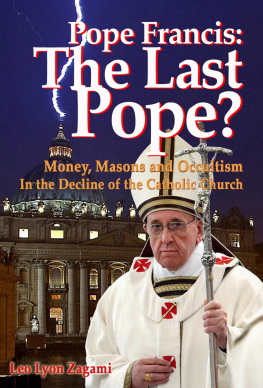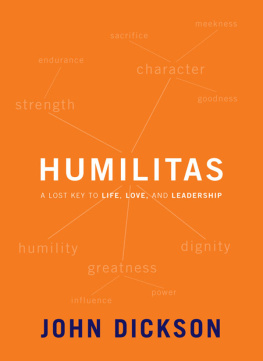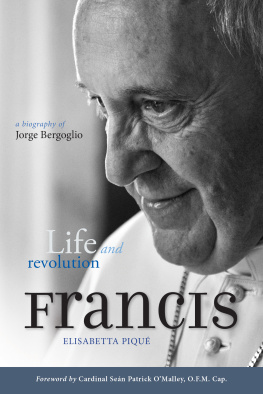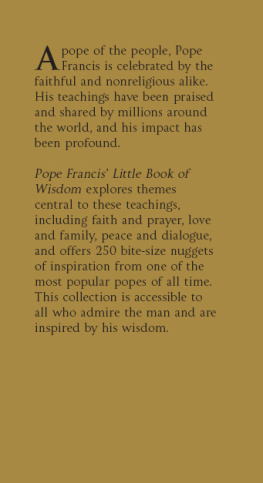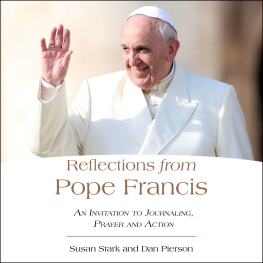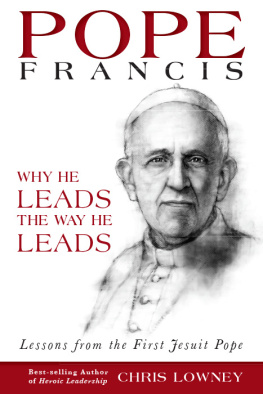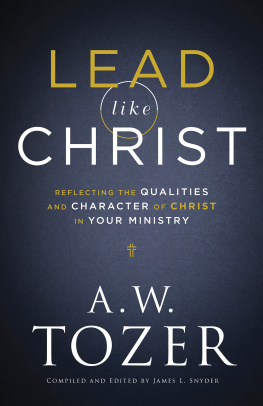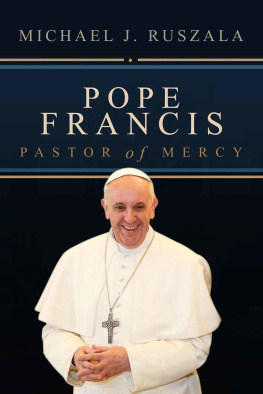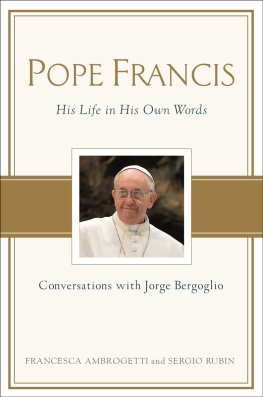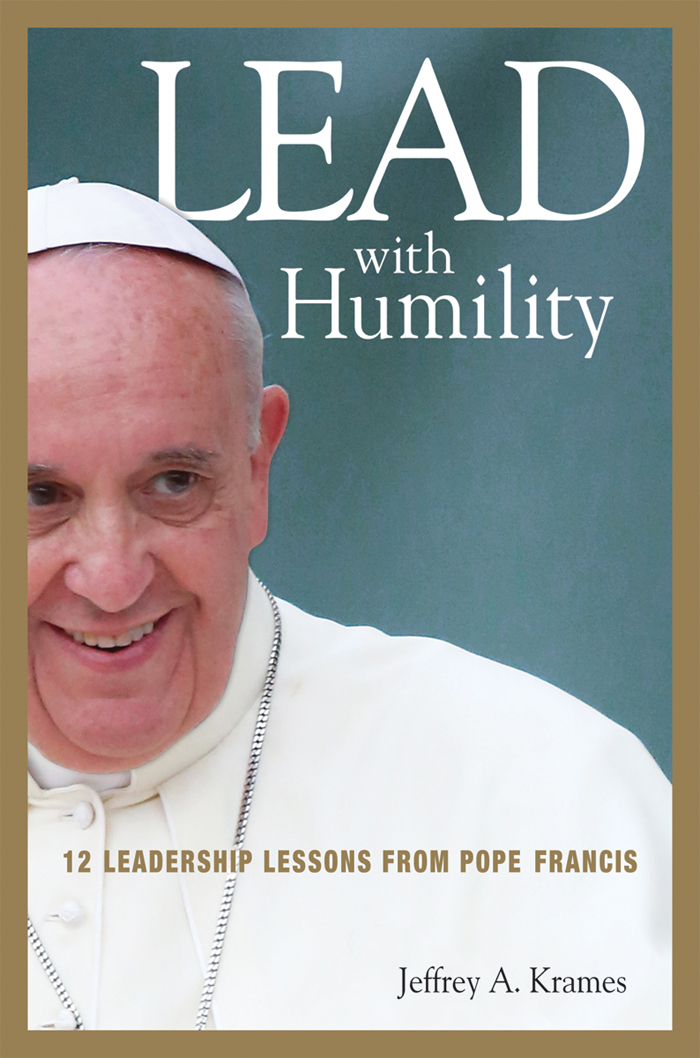LEAD
with
Humility
12 LEADERSHIP LESSONS FROM POPE FRANCIS
Jeffrey A. Krames

American Management Association
New York Atlanta Brussels Chicago Mexico City San Francisco
Shanghai Tokyo Toronto Washington, D. C.
American Management Association www.amanet.org
Bulk discounts available. For details visit:
www.amacombooks.org/go/specialsales
Or contact special sales:
Phone: 800-250-5308
E-mail: specialsls@amanet.org
View all the AMACOM titles at: www.amacombooks.org
American Management Association: www.amanet.org
This publication is designed to provide accurate and authoritative information in regard to the subject matter covered. It is sold with the understanding that the publisher is not engaged in rendering legal, accounting, or other professional service. If legal advice or other expert assistance is required, the services of a competent professional person should be sought.
Library of Congress Cataloging-in-Publication Data
Krames, Jeffrey A.
Lead with humility : 12 leadership lessons from Pope Francis / Jeffrey A. Krames.
pages cm
Includes bibliographical references and index.
ISBN-13: 978-0-8144-4911-0
ISBN-10: 0-8144-4911-5
1. Leadership. 2. Francis, Pope, 1936 I. Title.
HD57.7.K727 2015
658.4'092dc23
2014016979
2015 Jeffrey A. Krames
All rights reserved.
Printed in the United States of America.
This publication may not be reproduced, stored in a retrieval system, or transmitted in whole or in part, in any form or by any means, electronic, mechanical, photocopying, recording, or otherwise, without the prior written permission of AMACOM, a division of American Management Association, 1601 Broadway, New York, NY 10019.
The scanning, uploading, or distribution of this book via the Internet or any other means without the express permission of the publisher is illegal and punishable by law. Please purchase only authorized electronic editions of this work and do not participate in or encourage piracy of copyrighted materials, electronically or otherwise. Your support of the authors rights is appreciated.
About AMA
American Management Association (www.amanet.org) is a world leader in talent development, advancing the skills of individuals to drive business success. Our mission is to support the goals of individuals and organizations through a complete range of products and services, including classroom and virtual seminars, webcasts, webinars, podcasts, conferences, corporate and government solutions, business books, and research. AMAs approach to improving performance combines experiential learninglearning through doingwith opportunities for ongoing professional growth at every step of ones career journey.
Printing number
10 9 8 7 6 5 4 3 2 1
American Management Association www.amanet.org
This book is dedicated to my mother,
Trudy Krames (19332012);
my father, Barton Baruch Krames;
my amazing wife, Nancy;
and my incredible sons,
Noah Sidney and Joshua Michael.
These five souls have helped me to feel
closer to Pope Francis every day.
Contents
Prologue
F or me, this is not just another leadership book. It is a deeply personal one.
I am not a member of the Catholic Church. I am not even a Christian. I am the son of Holocaust survivors: My father was born in Poland and lost every member of his family to the Third Reich. His story is so incredible that it was recorded by Steven Spielbergs Shoah Foundationthe digital remembrance the famed director created after making Schindlers List.
My motherborn Jewish in Frankfurtwas orphaned when she was shipped to En gland with thousands of other children on the Kindertransport that began in late 1938.
I have never mentioned any of this in any of the other books I have written. It would not have been appropriate or pertinent in any other book. But I do so here, in this book about the leadership of Pope Francis, because my motivation for writing this book is informed, in large part, by my own lot in life as the son of Holocaust survivors.
My parents, both members of highly religious Jewish families, were deeply affected by Hitlers killing machine. For them, World War II never ended. They had to live with the horrific losses and the inhumane atrocities they witnessed and endured.
Countless studies have been done on the effects of the Holocaust on subsequent generations of survivors. For me, it meant that I was afraid to leave the small Bronx apartment I grew up inafraid that it was not safe to venture far from home for fear of the dangers that lurked outside. I picked that up from my father, Baruch Krames, who trusted no one during his unlikelythough ultimately successfultwo-year run from the Nazis.
During that time, he lived like an animal in the woods, but that did not stop him from stealing food from the rich in order to bring it back to people starving in the Jewish ghetto.
What my father experiencedand witnessedhas stayed with him for a lifetime. He witnessed his brother being shot as he and his older brothers ran from Nazi troops. He also witnessed, on more than one occasion, hundreds of dead Jews lying one atop the other on the back of large German flatbed military trucks like so many bricks piled high at some construction site. I, of course, witnessed no such things, but they are no less etched in my mind.
Worst of all, the teenage Baruch had to make a Sophies Choice like decision, leaving his younger brother on a train bound for Auschwitz as he escaped through a small hole in the wall of the train, a hole that other Jews used to gasp for a rare breath of air (and that was just one of three trains he escaped from, incredibly).
The Holocaust is a subject for another book; it is worth noting here, however, because I have always felt, very deeply and often not consciously, my parents pain. It was like being born into a family of ghoststhe ghosts of all of the people my parents lost under Hitler. It is why I have always placed such great importance on the respect and dignity of others, and why I am particularly sensitive to those who violate what I believe to be such core elements of the character that defines me.
What does all of that have to do with a leadership book on Pope Francis?
Shortly after the white puff of smoke lingered over the Vatican in March 2013, signaling the elevation of a new pope, Francis emerged as the anti-Hitleras someone who places enormous value on respect, dignity, and humanity in every shape, color, and form. He is the twenty-first centurys answer to the twentieth centurys most malevolent mass murderer.
This excerpt from Pope Franciss best-known homily underscores the point: Thou shall not kill sets a clear limit in order to safeguard the value of human life, today we also have to say thou shall not to an economy of exclusion and inequality.
The numbers reveal the polar opposites that these two world leaders represent. Most everyone knows that Hitler killed more than six million Jews. What is less known is that during 2013, his first year in Rome, Pope Franciss events and masses were attended by more than six million people, with many of those new or returning to the Church.
Examples abound of the utter humilityand humanityof Pope Francis. Before he became pope, Archbishop Jorge Mario Bergoglio would go out in the dark of night in Buenos Aires to offer help to poor people. Now, as pope, he has asked an archbishop to do this for him.


